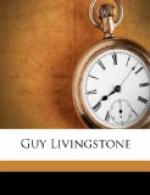The hurry of departure prevented any further conversation. At the station, just before the train started, Ralph said, grasping his comrade’s hand as he spoke, “I did not think you loved her so dearly.”
It was very long before he forgot the dreary look which accompanied the answer, “I did not know it myself till now.”
“I must trace the note,” the colonel muttered, as he strode away from the station. “That handsome tiger-cat has laid her claw on it, I am certain. But she won’t confess; red-hot pincers would not drag a secret from her, if she meant to keep it. I doubt if she will even betray herself by a blush. Poor Constance! What chance had she against such a Machiavel in petticoats? I am bad at diplomacy, too. If I only had the slightest proof, or if she had any weak point—unless she loses her head when she hears where Guy is gone, I have no chance of finding out much in that quarter. There’s Willis, to be sure—she bribed him, no doubt. D—n them both!” In this complimentary and charitable mood, he went straight to Flora Bellasys.
He found her alone. She was sitting in her riding-dress, and the broad Spanish hat, with its curling plumes, lay close beside her, with the gauntlets and whip across it.
She did not much like Mohun, for she had an idea that his sarcasms, with her for their object, had made Guy smile more than once approvingly. She knew, too, that all her fascinations recoiled harmlessly from that rugged block of ironstone. Whatever he might have been in early years, he was harder of heart than stout Sir Artegall now. Radigund, unhelming her lovely face, would never have tempted him to forego his advantage and throw his weapons down.
However, she greeted him with perfect composure and satisfaction.
“Do you join our party this afternoon, Colonel Mohun? I expect them to call for me every moment. We are going to the Croix de Berny, to see the ground for the race next week. Mr. Livingstone was to have lunched here; but I never reckon on his keeping an engagement.”
There was something in Ralph’s manner which made her uncomfortable. She took up her whip, and began twisting its slender stock rather nervously; you would not have thought there was so much strength in the delicate fingers.
“You are right,” he replied, coolly, “not to count too much on Guy’s punctuality. He is very uncertain in his movements. I fear he can not accompany you this afternoon. He would have charged me with his excuses, I am sure, if he had not been so hurried.”
Flora looked up quickly.
“It must have been something very sudden, then. Have you any idea where he is now?”
Ralph consulted his watch. “About Mantes, I should imagine. He started for Havre by the last train. He will be at Southampton, to-morrow, and the same day he can reach—”
He stopped, gazing at his companion with a cold, cruel satisfaction. The blood was sinking in her cheeks, not with a sudden impulse, but gradually—as the sunset rose-tints fade from the brow of the Jungfrau, leaving a ghastly opaque whiteness behind them. During the silence that ensued, a sharp tinkle might be heard as the jeweled head of the riding-whip, snapped by a convulsive movement, fell at Flora’s feet.




